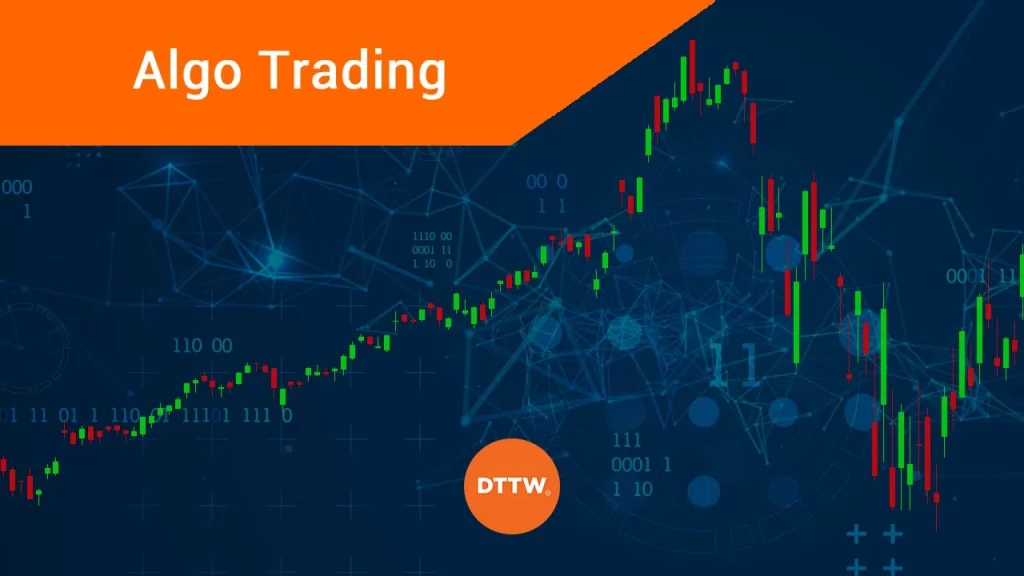Algo-Trading (Algorithmic Trading)


What is Algorithmic Trading?
The process of employing pre-programmed trading instructions to execute trade orders at rapid speed in the financial market is known as algorithmic trading. Trading software is used by investors and traders to supply trading instructions depending on time, volume, and price. When the set instructions are triggered in the market, the trading software executes the investor’s orders. In general, algorithmic trading is used by Mutual Funds, Hedge Funds, Insurance Companies, Banks, and other financial institutions to execute a huge number of high-volume deals that would otherwise be impossible for people to complete.
For individual investors, algorithmic trading allows for more trades in a shorter period of time without the impact of human emotions and trading blunders.
Understanding Algorithmic Trading
Algorithms govern how your phone works when you unlock it and launch an app. The rationale behind what you do, what you see, and how the application is tailored to your preferences is algorithms. With the advancement of modern technologies, practically every industry now bases its effectiveness on this logical code. Algorithms use user data, prior patterns, and a predefined set of instructions to accomplish the desired results. Mutual fund firms, for example, employ an algorithm to take a fixed amount from your bank account each month for a SIP.
Algorithms are not new to the Indian financial industry, as they are utilized in virtual transaction systems to provide trade transparency, an effective user experience, and the reduction of latency or glitches. However, the use of algorithms is not confined to banks or stockbrokers. Algorithms are regularly used by investors to reduce human errors and boost profit possibilities during trading. The procedure is known as Algorithmic Trading or Algo Trading.
Read related articles:
« Back to Glossary IndexDisclaimer
In line with the Trust Project guidelines, please note that the information provided on this page is not intended to be and should not be interpreted as legal, tax, investment, financial, or any other form of advice. It is important to only invest what you can afford to lose and to seek independent financial advice if you have any doubts. For further information, we suggest referring to the terms and conditions as well as the help and support pages provided by the issuer or advertiser. MetaversePost is committed to accurate, unbiased reporting, but market conditions are subject to change without notice.
About The Author
Damir is the team leader, product manager, and editor at Metaverse Post, covering topics such as AI/ML, AGI, LLMs, Metaverse, and Web3-related fields. His articles attract a massive audience of over a million users every month. He appears to be an expert with 10 years of experience in SEO and digital marketing. Damir has been mentioned in Mashable, Wired, Cointelegraph, The New Yorker, Inside.com, Entrepreneur, BeInCrypto, and other publications. He travels between the UAE, Turkey, Russia, and the CIS as a digital nomad. Damir earned a bachelor's degree in physics, which he believes has given him the critical thinking skills needed to be successful in the ever-changing landscape of the internet.
More articles

Damir is the team leader, product manager, and editor at Metaverse Post, covering topics such as AI/ML, AGI, LLMs, Metaverse, and Web3-related fields. His articles attract a massive audience of over a million users every month. He appears to be an expert with 10 years of experience in SEO and digital marketing. Damir has been mentioned in Mashable, Wired, Cointelegraph, The New Yorker, Inside.com, Entrepreneur, BeInCrypto, and other publications. He travels between the UAE, Turkey, Russia, and the CIS as a digital nomad. Damir earned a bachelor's degree in physics, which he believes has given him the critical thinking skills needed to be successful in the ever-changing landscape of the internet.






















































